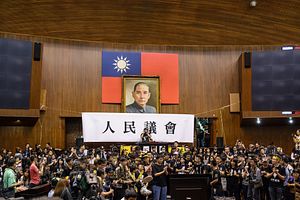Taiwan’s High Court on Tuesday overturned “not guilty” verdicts from a lower court and found seven Sunflower Movement protesters guilty of inciting others to commit crimes during the 2014 occupation of the Executive Yuan complex.
Key figures from the 2014 movement, in which students broke into Taiwan’s Legislative Yuan to protest a trade in services agreement with China, blasted the court’s decision.
The seven activists were sentenced to two to four months in prison, although the sentences are commutable to fines, usually between NT$1,000 to NT$2,000 per day (US$34 to $67), according to the Taipei Times. The decision can also be appealed.
Ten guilty verdicts previously handed down by the lower court to other protesters were also upheld by the High Court on Tuesday. An 11th guilty verdict was not appealed. Eight of those 11 defendants were found guilty of obstructing official business; the other three of damaging public property.
Among the seven protesters found guilty are Wei Yang, who led the Executive Yuan occupation, and prominent Sunflower figures Yoshi Liu and Chen Ting-hao.
“Wei and other people wrote messages and urged people to emulate the occupation of the Legislative Yuan at the time by occupying the Executive Yuan,” the High Court said in its ruling. “In objective and subjective considerations, they intended to incite others to commit crime.”
Wei condemned the ruling, saying the protesters joined the attempted occupation out of their own volition and were not “mobs following a crowd’s actions.”
“This decision insults everyone who participated in the action that night,” he said. “It is an insult not only against us seven, but the tens of thousands of Taiwanese who took part in the Sunflower Movement.”
On March 23, 2014 – five days after the start of the student occupation of the Legislative Yuan – a group of students tried to occupy the Executive Yuan. They were removed by police, using batons and water cannons, in the early hours of March 24.
The students were protesting the Cross-Strait Service Trade Agreement, a free trade agreement between China and Taiwan during the administration of then-President Ma Ying-jeou of the Kuomintang (KMT). Opponents feared the deal would allow for rampant Chinese investment at the cost of Taiwan’s democratic freedoms.
KMT legislator Chang Ching-chung rushed the agreement through the legislature without debate on March 17, 2014, sparking the occupation of the legislature the following day.
The agreement was later scuttled due to the protests, which gave momentum to the 2016 election victory of Taiwan’s current President Tsai Ing-wen and her Democratic Progressive Party (DPP). The protests were cheered globally as a success story.
Tuesday’s verdicts drew outrage from prominent Sunflower figures such as Lin Fei-fan and Aman Wu, both of whom joined the DPP and took high-ranking positions to support Tsai’s successful 2020 reelection bid.
Independent legislator Freddy Lim and DPP legislator Lai Pin-yu, both activists who later moved into politics, also criticized the verdict, as did civil society groups.
Lim said then-premier Jiang Yi-huah “ordered police to use violent means to remove the protesters,” one of whom was beaten and later died of his injuries.
“However, the officers who assaulted the protesters … cannot be found to this day,” he said.
Jiang, however, praised the court ruling, saying the Executive Yuan occupation “was not a peaceful protest, and the Sunflower Movement was not a civil disobedience movement.”
“Justice is usually delayed, but it will come eventually,” Jiang said.
The verdicts came as a surprise to many in Taiwan. As New Bloom noted, previous charges brought against Sunflower activists who occupied the Legislative Yuan had been dropped as their actions were seen as civil disobedience.
The Tsai administration has, at times, incorporated Sunflower activists and has generally been supportive of the movement’s legacy. The opposition KMT, however, has maintained the belief that students attacked police and vandalized government property.
Taiwan, under Tsai, has signaled its support for Hong Kong’s ongoing pro-democracy protests. Hundreds of Hong Kong dissidents have fled to Taiwan. They include Lam Wing-kee, the Causeway Bay bookseller who reopened his bookstore on Saturday in Taipei after fleeing Hong Kong last year over fears of being extradited to China, which considers him a fugitive.
Many of the Hong Kong dissidents are fleeing criminal charges brought against them in Hong Kong, an irony that was not lost on Taiwanese internet users critical of the verdicts on Tuesday.

































